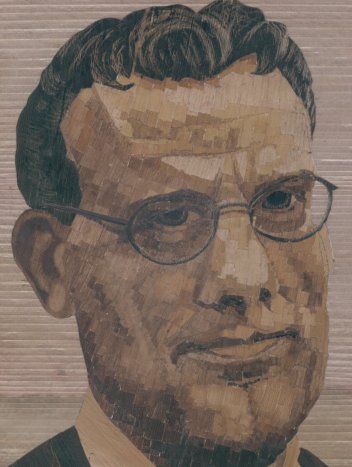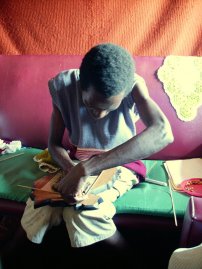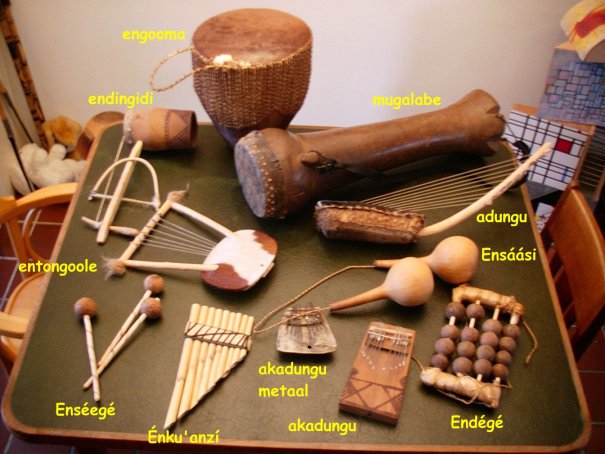MIND: Help Someone To Set Up A Business
Agriculture example
 Faith
Gloria Namuwaya, 26, lost her husband some four years ago and decided not to
marry again. She has one child and a step-child, works as a secretary of the
Kamuli Polytechnic, she is very intelligent and....she saves! She is one of the
few saving persons I met in Uganda. From the money she bought a plot. The rest
of her saving she lost to the hospital when her child got ill, but since she is
very much appreciated by her relatives for working hard and planting a highly
productive banana plot on family soil, she got the hospital cost refunded from
an uncle. For that money, she bought a cow, which is pregnant now. The cow is in
some relative's herd at the moment. Faith, looking at me, smiling: "It's nice to
be alone". A very unusual statement in Africa.
Faith
Gloria Namuwaya, 26, lost her husband some four years ago and decided not to
marry again. She has one child and a step-child, works as a secretary of the
Kamuli Polytechnic, she is very intelligent and....she saves! She is one of the
few saving persons I met in Uganda. From the money she bought a plot. The rest
of her saving she lost to the hospital when her child got ill, but since she is
very much appreciated by her relatives for working hard and planting a highly
productive banana plot on family soil, she got the hospital cost refunded from
an uncle. For that money, she bought a cow, which is pregnant now. The cow is in
some relative's herd at the moment. Faith, looking at me, smiling: "It's nice to
be alone". A very unusual statement in Africa.
The plot needs to be cleaned before something can be grown there. MIND lent
her a bike to reduce frictions of travelling between her plot and her job,
and money for men to clean the plot. She calculated that she will likely earn
back the investment in three years, but MIND will allow her to reinvest the
money first in a house to be built on the plot, and start refunding only after
this has been paid for. A house costs not much more than 500 EURO (!), but
that is the value of the land's cash crop of six planting seasons (three years).
MIND is very curious how this will end. It is hoped MIND shall learn about
the possibilities and risks and agriculture in the Ugandan environment, about
the Ugandan way of running business and dealing with debt, and correctly judging
the people we deal with, and the way their ties with their culture affect their
plans and intentions.
Craft example: Portraits
 This
portrait of the president of our foundation is a collage (small pieces of banana
fibre glued on a large piece of banana fibre leaf 20x30cm). Bananafibre is an
extremely durable and strong material, even hammocks are made of it. It is made
by Kyagula Zon', generally called "Zoni".
This
portrait of the president of our foundation is a collage (small pieces of banana
fibre glued on a large piece of banana fibre leaf 20x30cm). Bananafibre is an
extremely durable and strong material, even hammocks are made of it. It is made
by Kyagula Zon', generally called "Zoni".
You could order a portrait. Zoni will need a photograph.
 Zoni
lives in Bugembe, near Victoria lake. Most of his relatives live on the lake
islands, but his parents came ashore. They both turned into alcoholics and left
him while he was still a small child. He became a "destitute", as he puts it.
Lacking money to finish high school he decided to make and sell art and craft.
Meanwhile he succeeded in teaching himself reading and writing. He showed me a
complete manuscript of a book on people near him whose life he follows and
comments in order to establish to basic truths of African life. He also refers
to what he learned about the history of Africa, claiming that it is not good to
blame the whites for all suffering, because many blacks made there own
contribution to it by treating other blacks very badly.
Zoni
lives in Bugembe, near Victoria lake. Most of his relatives live on the lake
islands, but his parents came ashore. They both turned into alcoholics and left
him while he was still a small child. He became a "destitute", as he puts it.
Lacking money to finish high school he decided to make and sell art and craft.
Meanwhile he succeeded in teaching himself reading and writing. He showed me a
complete manuscript of a book on people near him whose life he follows and
comments in order to establish to basic truths of African life. He also refers
to what he learned about the history of Africa, claiming that it is not good to
blame the whites for all suffering, because many blacks made there own
contribution to it by treating other blacks very badly.
 Zoni
does not want to get rich. He wants to help other destitutes, now he feels able
to do that, because he understands them so well. He lives together with a group
of destitutes, they grow their own food crop, and try to sell home made art and
craft to get money for school fees.
Zoni
does not want to get rich. He wants to help other destitutes, now he feels able
to do that, because he understands them so well. He lives together with a group
of destitutes, they grow their own food crop, and try to sell home made art and
craft to get money for school fees.
The special thing of Zoni is that he never asks for money, as almost
every Ugandan does to whites. We have a lot, don't we? But he explained me a
special reed weaving machine he had invented, which unfortunately could not be
finished due to the price of parts he needed. Now, Zoni and MIND are business
partners: once his machine is running, MIND's money will be refunded from its
proceeds (MIND hopes...).
Craft example: Musical Instruments
Numerous craftsmen in Uganda make the kind of musical instruments so popular
among young music class pupils in the West. They usually make on order because
they often need the buyer's money to purchase their materials (such as skins,
nails and rope). Thus, they are dependent on local Ugandan musicians, local
schools, and tourists. They can be helped with means to produce stocks of a size
interesting to wholesalers to be shipped to Western countries. We want to find
out whether, if well organized, this could lead to sufficient sustained capital
formation.

Adungu,
a 9 snare harp, orig Nebbi and Arua tribe, now conquerened Uganda, generally
called a "modern instrument", tuned sometimes diatonic, sometimes pentatonic.
Akad�ng�, Akadungu, Thumbpiano Orig: Achioli, Names: Sansa,
Ukeme, Akogo. Teso tuning: somidolareso || ladoremisorela, Busoga tuning:
sodolamireso || ladosomiladore, pentatonic scale doremisolado
Emb�ir�, (not shown) Wooden Xylophone, pentatonic.Usually four
of five octaves
End�g�, leg or necklace bell, also used for sheep. (On each leg
you wear two)
Ens��si seed shaker made from calebash
Eng�m�, drum, made of cow skin. Nowadays Dutch (Frisian) cows
are popular so you find more and more black-white engoma's
�n'd�ngid�, Fiddle orig: Buganda, Busoga, Bugisu, others
Ent�n'g�ol�, Nt�n'g�ol�, Harp
�nku'anz�, Panflute orig: Busoga Buganda
Ens�eg�, Shaker
Mug�lab�, Eng�lab�, Long drum, beaten with hands, it lizzard
skin yields a sharp, metal like attack
Note:
As these objects are hand made by creative persons on the basis of their own
personal opinions and changes therein, no two copies of these instruments are
equal.
 Faith
Gloria Namuwaya, 26, lost her husband some four years ago and decided not to
marry again. She has one child and a step-child, works as a secretary of the
Kamuli Polytechnic, she is very intelligent and....she saves! She is one of the
few saving persons I met in Uganda. From the money she bought a plot. The rest
of her saving she lost to the hospital when her child got ill, but since she is
very much appreciated by her relatives for working hard and planting a highly
productive banana plot on family soil, she got the hospital cost refunded from
an uncle. For that money, she bought a cow, which is pregnant now. The cow is in
some relative's herd at the moment. Faith, looking at me, smiling: "It's nice to
be alone". A very unusual statement in Africa.
Faith
Gloria Namuwaya, 26, lost her husband some four years ago and decided not to
marry again. She has one child and a step-child, works as a secretary of the
Kamuli Polytechnic, she is very intelligent and....she saves! She is one of the
few saving persons I met in Uganda. From the money she bought a plot. The rest
of her saving she lost to the hospital when her child got ill, but since she is
very much appreciated by her relatives for working hard and planting a highly
productive banana plot on family soil, she got the hospital cost refunded from
an uncle. For that money, she bought a cow, which is pregnant now. The cow is in
some relative's herd at the moment. Faith, looking at me, smiling: "It's nice to
be alone". A very unusual statement in Africa.  This
portrait of the president of our foundation is a collage (small pieces of banana
fibre glued on a large piece of banana fibre leaf 20x30cm). Bananafibre is an
extremely durable and strong material, even hammocks are made of it. It is made
by Kyagula Zon', generally called "Zoni".
This
portrait of the president of our foundation is a collage (small pieces of banana
fibre glued on a large piece of banana fibre leaf 20x30cm). Bananafibre is an
extremely durable and strong material, even hammocks are made of it. It is made
by Kyagula Zon', generally called "Zoni". Zoni
lives in Bugembe, near Victoria lake. Most of his relatives live on the lake
islands, but his parents came ashore. They both turned into alcoholics and left
him while he was still a small child. He became a "destitute", as he puts it.
Lacking money to finish high school he decided to make and sell art and craft.
Meanwhile he succeeded in teaching himself reading and writing. He showed me a
complete manuscript of a book on people near him whose life he follows and
comments in order to establish to basic truths of African life. He also refers
to what he learned about the history of Africa, claiming that it is not good to
blame the whites for all suffering, because many blacks made there own
contribution to it by treating other blacks very badly.
Zoni
lives in Bugembe, near Victoria lake. Most of his relatives live on the lake
islands, but his parents came ashore. They both turned into alcoholics and left
him while he was still a small child. He became a "destitute", as he puts it.
Lacking money to finish high school he decided to make and sell art and craft.
Meanwhile he succeeded in teaching himself reading and writing. He showed me a
complete manuscript of a book on people near him whose life he follows and
comments in order to establish to basic truths of African life. He also refers
to what he learned about the history of Africa, claiming that it is not good to
blame the whites for all suffering, because many blacks made there own
contribution to it by treating other blacks very badly. Zoni
does not want to get rich. He wants to help other destitutes, now he feels able
to do that, because he understands them so well. He lives together with a group
of destitutes, they grow their own food crop, and try to sell home made art and
craft to get money for school fees.
Zoni
does not want to get rich. He wants to help other destitutes, now he feels able
to do that, because he understands them so well. He lives together with a group
of destitutes, they grow their own food crop, and try to sell home made art and
craft to get money for school fees. 